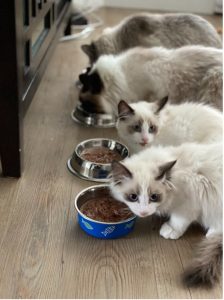 Every cat owner wants what’s best for their furry friend. From choosing the right toys to ensuring they receive the best medical care, cat parents go to great lengths for their feline family members. When it comes to nutrition, there’s always a quest for foods that can be both delicious and nourishing for cats. Lately, many are turning to rice. But is rice suitable for cats? Let’s explore.
Every cat owner wants what’s best for their furry friend. From choosing the right toys to ensuring they receive the best medical care, cat parents go to great lengths for their feline family members. When it comes to nutrition, there’s always a quest for foods that can be both delicious and nourishing for cats. Lately, many are turning to rice. But is rice suitable for cats? Let’s explore.
Why Consider Rice for Cats?
Rice, a staple in many human diets, offers several benefits:
Easily Digestible: Rice is often recommended for individuals with stomach upsets because of its easy digestibility. Similarly, for cats with digestive troubles, rice can be a gentle food option.
Energy Source: Rice provides carbohydrates, which can be a source of energy. Though cats primarily rely on proteins, some carbs can be beneficial.
Low in Fat: Rice is low in fats, making it an ideal choice for overweight cats when combined with other nutrient-dense foods.
The Right Way to Serve Rice to Cats
If thinking about introducing rice to a cat’s diet, always remember:
Cook it Thoroughly: Always serve cats well-cooked rice. Uncooked rice can be difficult for them to digest and can lead to gastrointestinal issues.
No Additives: When cooking rice for cats, skip the salt, butter, and other seasonings. Plain rice is best.
Combine with Protein: As obligate carnivores, cats need protein. While rice can be a beneficial side, it should never replace the primary protein source. Consider mixing rice with chicken or tuna for a balanced meal.
Things to Keep in Mind
Moderation is Key: Like all things, rice should be given in moderation. It shouldn’t be the primary component of the diet but can be a supplementary one.
Check for Allergies: While rare, cats can be allergic to anything. Introduce rice slowly and watch for any adverse reactions.
Consult a Vet: Always consult with a veterinarian before making significant changes to a pet’s diet. They can provide guidance tailored to individual cats.
